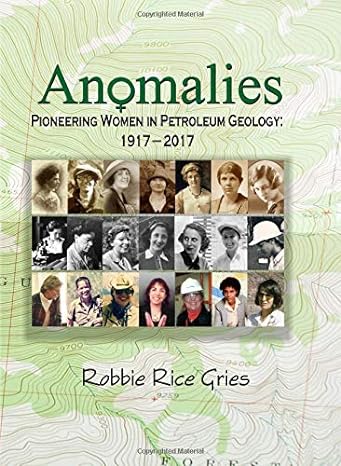Robbie Gries was named a HGS Legend in 2003, along with Michel T. Halbouty, Tom Barrow, Bill Barrett, and Marvin Davis. She remains the only woman featured in the HGS legend series, a recognition periodically shared in the January Bulletin. This designation is fitting for Gries, who has worked throughout her career to break barriers for herself and other women in Oil and Gas careers. In addition, Gries has worked to highlight and amplify the stories of women geoscientists and published many of their stories in her book, Anomalies—Pioneering Women in Petroleum Geology: 1917-2017.
Risk-taking is one of Gries’ key characteristics. Her entry into geology, education, and professional career are marked by taking chances and demonstrating resilience. For example, Gries took an introductory geology class “on a whim” at Del Mar University in the fall of her sophomore year. She says she was “mesmerized,” so she took the second introductory course in the spring semester. As the top student in geology, she was awarded a scholarship and took the risk to move out of state continuing her education at Colorado State University in Ft. Collins. In 1964, she qualified for a National Defense Education Act loan that allowed her to finish her geology degree and become the first woman to graduate in the university’s geology department. Unlike her male counterparts, she wasn’t offered guidance on how to get a job. So, she decided to continue her education and take advantage of in-state tuition, by returning to Texas to earn a MS degree from the University of Texas at Austin.
Following graduation, marriage, and the birth of her daughter, Gries moved with her husband to Kansas where he commenced a teaching assignment at Wichita State University. Gries wanted a geology career of her own. To achieve that goal, she ended her marriage and took a risk by moving Houston in 1973. The risk worked out, because it was that year that the federal government required Oil and Gas companies to implement a diversity plan to hire women and minorities.
Gries joined Texaco in their Denver office. “I had a great boss who was very supportive. He called me ‘token,’ as the first woman in the district,” she laughs. Gries’ approach of using tolerance and humor to address gender bias is another of her key characteristics. “Most men didn’t know any better. I found that tolerance and humor worked better than anger,” she says.
Gries continued to take risks by leaving the relative stability of a large corporation in 1977 to join small independent Oil and Gas companies in Denver. She learned a broad set of geoscience, geophysics, land and business skills, and developed the confidence to go out on her own. After an industry downturn in the late 1980s, Gries again took a risk by pivoting her skill set into mergers and acquisitions. The risk paid off and resulted in Gries becoming an officer in a company for which for which she facilitated a merger.
In 1994, Gries founded her own company, Priority Oil and Gas, LLC by buying up uneconomic oil fields that she sought to develop. “At that time, engineers thought that one well could drain one square mile, but we were learning that was crazy,” Gries says. Gries recruited partners to supply the drilling capital and ultimately drilled 134 wells.
Developing and maintaining relationships is another of Gries’ key characteristics. This focus on relationships allowed her to fund drilling campaigns at Priority and maintain friendships with some of those investors today. Gries says that she has always focused on building relationships and prioritized professional service to organizations such as AAPG and Rocky Mountain Geological Association. She believes that the professional relationships she developed through societies allowed her to be a successful consultant and independent. “You need a network of people, unless you are independently wealthy,” laughs Gries.
Reflecting on the risks she took in her career, Gries says, “I grew up poor, and knew how to be poor again.” She says its in her nature to tolerate risks. “There were months when I wouldn’t have money for rent, but then a deal would come together and the money would work out,” she describes.
Now at 80 years old, Gries describes herself as semi-retired. She sold most of her production acreage in 2020, but still holds a few working interests. She now focuses more of her time on studying the history of women in petroleum geoscience and telling their stories in talks and in print. Like the women she amplifies, Gries took risks to break multiple barriers, ranging from being one of the first women to be admitted to the Petroleum Club of Denver to being the first woman president of the American Association of Petroleum Geologists. She continues to approach business and life with humor, tolerance, and a focus on building relationships.

